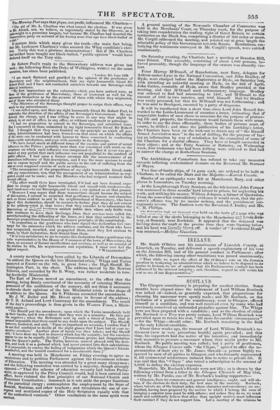A county meeting having been called by the Liberals of
Devonshire "to address the Queen on the late Ministerial crisis," Whigs and Tories mustered at Exeter on the 8th, in great force ; the High Sheriff, Mr. Codrington Parr, in the chair. The address, moved by Mr. Newton Fellowes, and seconded by Sir B. Wrey, was rather moderate in tone, but decidedly Ministerial. The Earl of Devon moved an amendment, to the effect that the meeting, being firmly convinced of the necessity of selecting Ministers possessed of the confidence of the country, did not think it necessary to obtrude their opinions of the late Ministerial crisis in the shape of an address to the Queen. Sir S. Prideaux seconded the amendment.
Mr. J. W. Buller and Mr. Divett spoke in favour of the address ; Sir T. D. Acland and Lord Courtenay for the amendment. The result of the day's proceedings is thus given in the Western Times, a Minis- terial paper— "The Sheriff put flee amendment ; upon which the Tories immediately held Up their hands, and it was evident that they were in a minority. He then putt the negative; when the Reformers sent up such u forest of hands, that it seemed impossible that there could be any doubt upon the subject. The Sheriff, however, hesitated, and said, 'Upon so important an occasion, I confess that I do not feel confident to decide at the slight glance that I have had at your re- spective numbers.' Another show of hands was then taken ' • and the Sheriff said,4I have done my best to discover which has the majority, but the numbers appear to me to be equally divided.' (Tremendous groans and disapprobation from floe Queen's party. The Tories, however, seemed pleased with the deci- sion, and took it as a godsend which had never entered into their calculations. It is impossible to convey the feeling of indignation which the Queen's friends Manifested, and the tumult continued for a considerable time.)"
A meeting was held in Manchester on Friday evening, to agree to resolutions and to petition Parliament against the Government scheme of Education. The meeting was attended by a great many clergymen ; and the following resolution was carried by a majority, though strongly opposed--." That the scheme of education recently laid before Parlia- ment, as approved by the Privy Council, would, had it been carried into effect, have violated the first principles of our National Church and Protestant Constitution ; inasmuch as it sets aside the proper functions of the parochial clergy ; contemplates the employment by the State of Romish, Socinian, and other teachers ; and recognizes the use of cor- rupted and mutilated copies of the Holy Scriptures equally with that of the authorized versions." Other resolutions in the same spirit were carried. A general meeting of the Newcastle Chamber of Commerce was held in the Merchants' Court, on Thursday week, for the purpose of taking into consideration the trading right of Great Britain to certain, territories on the Black Sea, comprising a district of 300 miles or more. Mr. Cargill addressed the meeting, and pointed out at great length the miserable policy of this Government towards Russia. Resolutions, em- bodying the sentiments conveyed in Mr. Cargill's speech, were carried unanimously.


























 Previous page
Previous page